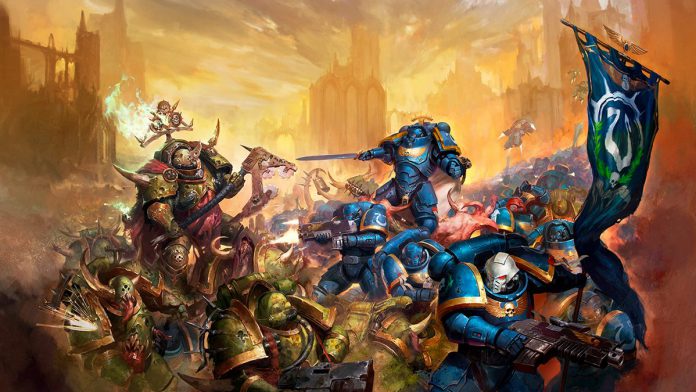I am in the (rather fortunate) position that academic approaches to nerdy topics is extremely “on brand” – and that I have the resources to support that as a throughline alongside more serious academic research.
All of which is to say I got sent the call for submissions for the first ever Warhammer-focused conference about a dozen times over the course of the last several months. And, two abstract submissions, a surprising amount of anxiety regarding said submissions, a nine-hour flight to Frankfurt and a 45-minute bus ride later, I had the privilege of attending in person, at the University of Heidelberg, more specifically at the Käte Hamburger Centre for Apocalyptic and Post-Apocalyptic Studies, which is possibly the coolest academic unit name I have ever encountered.
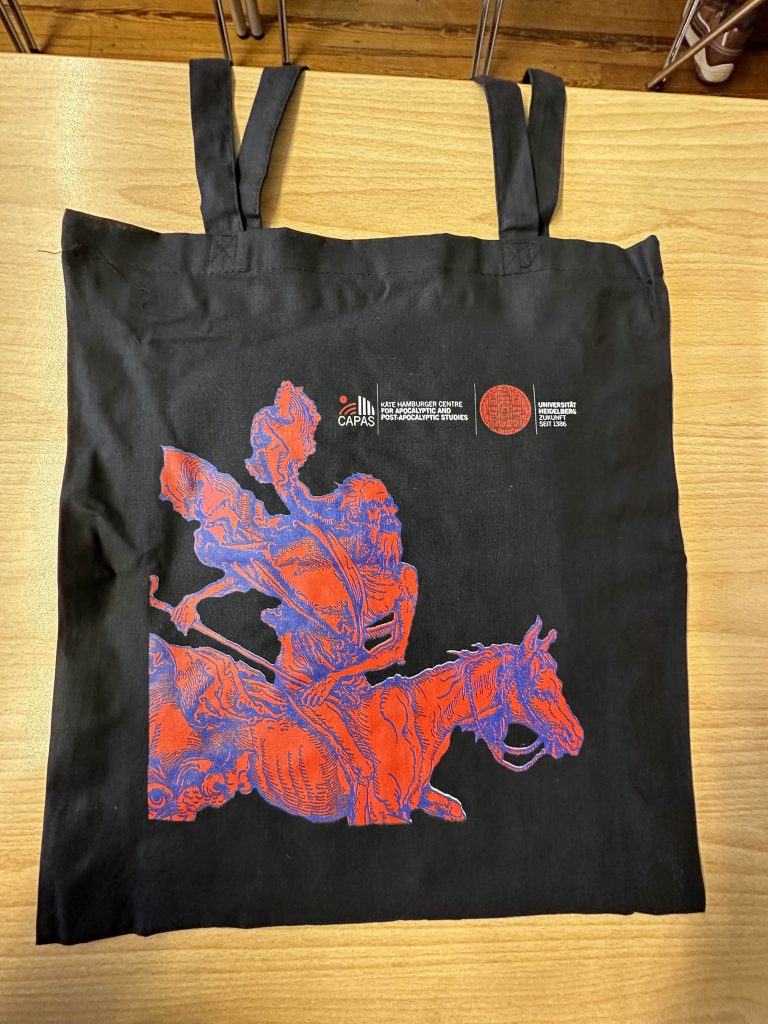
So what exactly is a Warhammer-focused conference like?
What It Is and Isn’t
Looking at reactions online, one of the major observations I had is that a lot of people don’t know what an academic conference is. No, it isn’t sponsored by Games Workshop (if you want corporate-sponsored conferences, medicine is your best bet). No, it isn’t a particularly savvy career move for anyone involved – very few universities will care about this much, and when blending nerdy topics and academia, the reaction you are most often aiming for is ambivalence. Being labeled “not serious” is something of a career threat.
And more surprisingly to some, no it isn’t really about Warhammer the game, though there were some talks along those lines.
I can speculate on some reasons for this – game design conferences and workshops are very much their own thing. And as an academic conference, game studies programs in their various forms are wildly outnumbered by broader humanities and social science departments that would be interested in Warhammer in one way or another. And when it comes down to it, that’s where the organizers of the conference come from, which both frames the conference and who thinks “I should submit to this” and also what gets accepted.
That is not to say that Warhammer being a game didn’t absolutely pervade the conference, from some dedicated talks or discussions to a lot of slides showing off people’s minis and a section in the abstract submission asking about your involvement with various aspects of the hobby.
I will also say that the organizers put a lot of work into making the conference easily available. Abstracts could be presented online, and each one of the three sessions going on at a time were streamed, at least one of those sessions being a dedicated online session. Registration was also free, both online and in-person, which is commendable for an event being held on an obviously shoe-string budget. This did occasionally involve one of the organizers sprinting down a hallway to resolve one tech-related issue or another.
The Origin Story
So how did something like this even come about? According to one of the organizers, Dr. Mike Ryder, the conference emerged from a group of strangers in several countries all trying to get publishers to consider Warhammer as a potentially scholarly subject, having said pitches be dismissed because Games Workshop isn’t big enough (a helpful reminder that the major force in our small hobby is still…fairly small), and eventually finding each other via a blog post.
To me, going from that to running a successful international conference, even a modest one, is rather impressive.
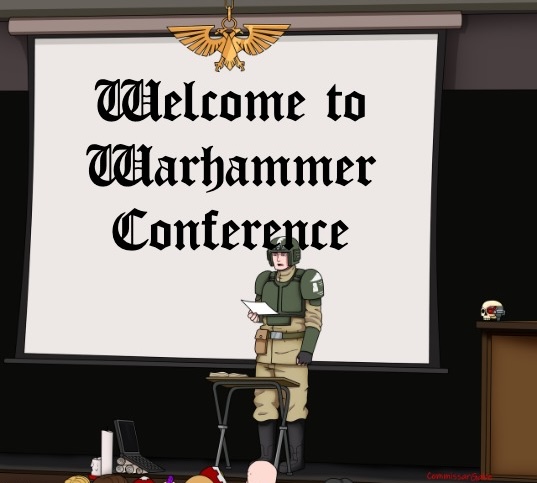
The Venue and Vibe
For someone who primarily goes to academic conferences in meeting rooms connected to a Marriott, having a conference in the picturesque old town of a German city, in one of the oldest universities of the world was a lovely change of pace.
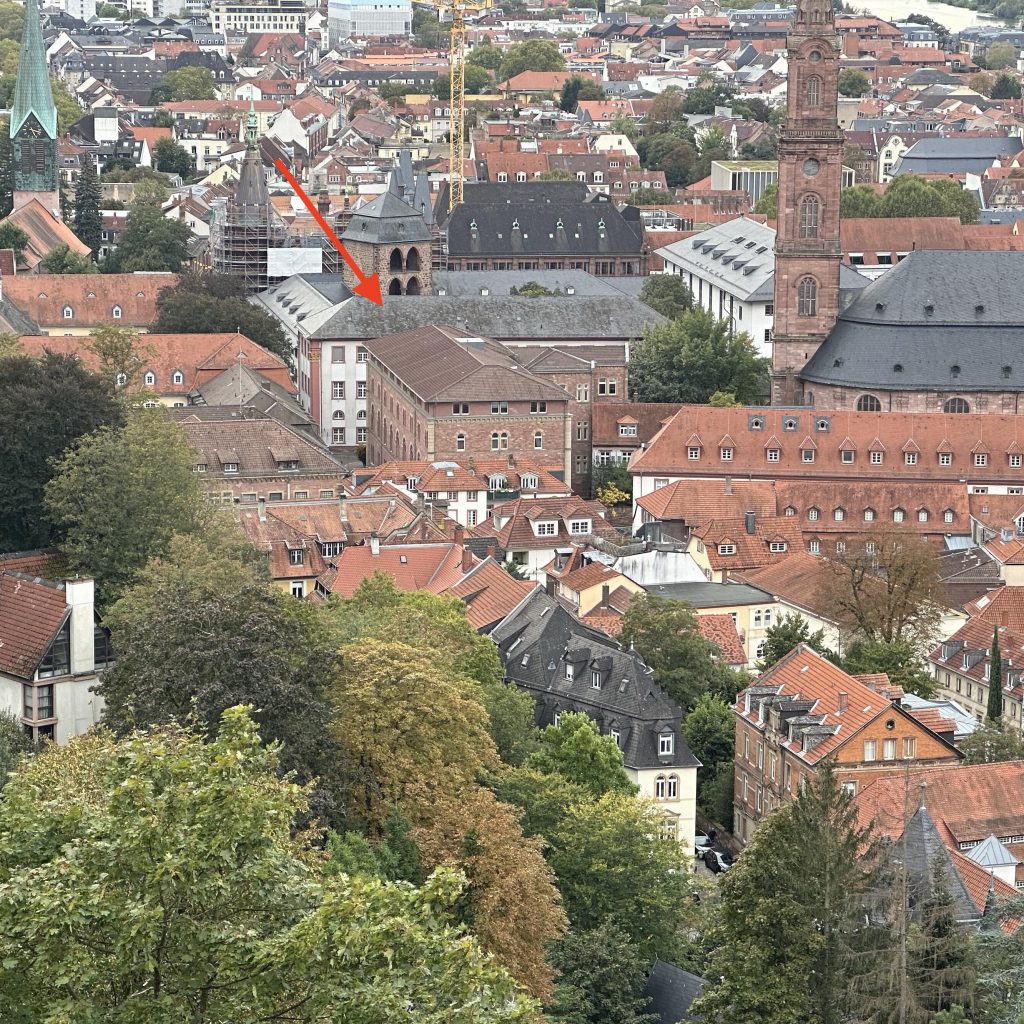
The conference itself was in two smallish seminar rooms, which made for a fairly intimate atmosphere, with a fairly substantial online audience for each talk. The energy during the conference itself was great – from watching people online painting miniatures while they listened in to the questions in the room, everyone was clearly glad to be there. It’s easy to be cynical in academia generally, and it’s easy to be cynical about something like this conference, which is in essence trying to apply an academic perspective to a game of toy soldiers, some video games, and a series of sci-fi pulp novels. Some version of “Don’t you have something better to do?” and “Touch grass” is an easy critique to reach for. It’s also easy to overcompensate and take oneself terribly seriously as a sort of defense mechanism. Thankfully, very little of either was on display, and both the in-person audience and the folks online were genuinely one of the best conference audiences I’ve ever been around. Everyone was eager, wanted to discuss more, and there was very little in the way of gatekeeping or posturing. When other people’s talks were referenced, it was almost always “So I got an idea from that and…”
One downside – a common one in our hobby – is that the gender balance was dire. Coming from public health conferences, which are usually 60-70% women, it was actively jarring. But that’s also part of a wider discussion for the hobby as a whole.
The Talks
First of all, many of the talks and both of the keynotes are available online here, with more being added every day.
As for the talks themselves, let’s talk about the keynotes first. The first was delivered by John Blanche and took the form of an interview that was recorded a couple days before due to medical issues. John is an absolute giant in the field and looms large over what we think of as “Warhammer”, especially if we’re talking about the art and literature side. He made an interesting bit of distinction between his vision and the armies-as-art, which obviously interests him considerably less, and are not particularly his style. It was also an interesting look into his inspirations – Scandinavia and what he calls the “Northern Renaissance”, and his own view of his place in Games Workshop, especially now that he’s retired (the man has an enviable lack of fucks to give). There were also some interesting notes of discordance in his perception – how can one be both detached from the business side of things and susceptible to needing to tone things down for American sensibilities?
The second talk was by Victoria Hayward and focused on her process for Deathworlder. This ranged from her thoughts on how to write a book set in a part of the timeline of a Tyranid invasion where the battle is over and most novels would have ended, to her thoughts on the Catachan. Her talk was one of the ones I best thought highlighted some of the ideas of the conference. At their core, the Catachan are little pieces of grey plastic, born of the notion that 80’s action movies are pretty cool. There’s no actual need to go beyond that – but you can. You can ask what arriving on a world like Catachan would do to the colonists who settled it. What kind of people that world would forge, beyond feats of combat strength. What kind of culture do they have, what kind of values? Who they are as people that an author needs you to like and bond with and maybe be a little upset when they die. Things that make them human – but bounded by the setting they exist in.
It was really quite good.
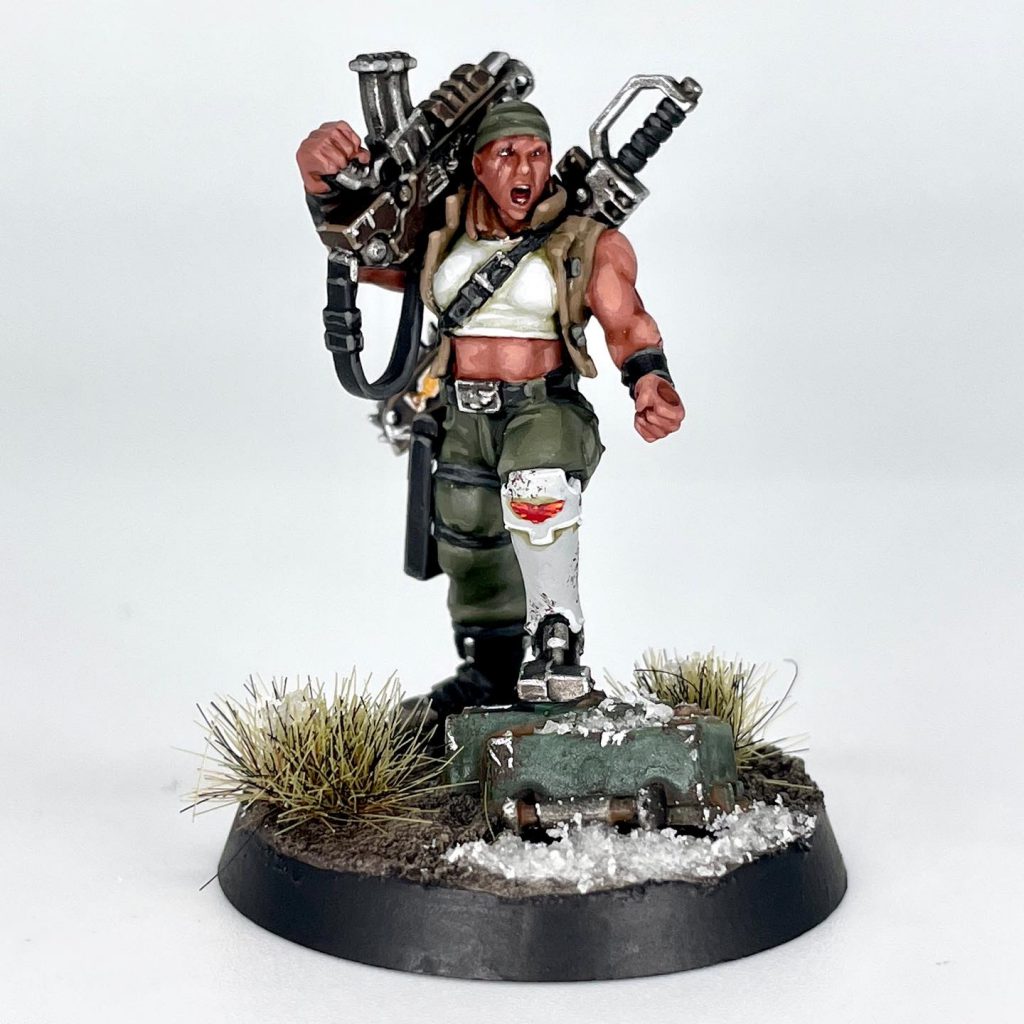
The more academic talks (all of which are gradually being uploaded here) covered a tremendous range of topics, despite my initial perception of the draw of the conference being somewhat narrow. I’m still working my way through the many talks I wasn’t able to see in person, and I do encourage everyone to at least give the assembled videos a browse. There was a talk on differing conceptions of what exactly is a Crusade (turns out this is more complicated than I imagined), a middle school teacher’s experiences using Warhammer 40,000 as a tool for social-emotional learning and what that entails, and a discussion of the implications of the Imperium as both an oppressive setting rife with rebellion – and the narrative conceit that those rebels, at least at the end stage of their revolts, are worse. One of my favorites was the necessity of humor in the setting as an outlet that lets us engage with the darker elements, and how that appears at the system level (the entirety of Blood Bowl), at the game level (you have to laugh when a conscript with a bayonet kills your Warlord, and the way most GW games are designed expressly promote this, intentionally or otherwise), and at the setting level (Orks).
It’s been my experience that there are three types of conference talks:
- “This is a brief overview of a much more complex paper”
- “This is a complete idea, but probably not enough to be a full paper”
- “I’m field testing an idea”
All three were in evidence, and admittedly, they weren’t all bangers. Because the conference was transdisciplinary, many of these were surface treatments, because 15-20 minutes isn’t enough time to really get into the weeds. Mine, for example, relied heavily on visuals and broad-strokes qualitative descriptions of results. And given the breadth of the fields involved, and one of the objectives of the conference seeming to be feeling out if there’s enough meat on this particular bone for deeper scholarship in the future, I think that was actually a good choice by most of the presenters. This also let the audience be actively engaged with the material – which given this audience was particularly welcome. I think I only heard one “…was there a question in there?” in response to someone’s question, which is something of an achievement.
One of the things it was nice not to spend time on was common reference points. Even if they hadn’t played it, everyone understood what Necromunda was, at least in broad strokes. Nor did I have to spend two slides explaining why Lorgar sitting dead center in another legion’s co-appearance network is the worst possible thing.
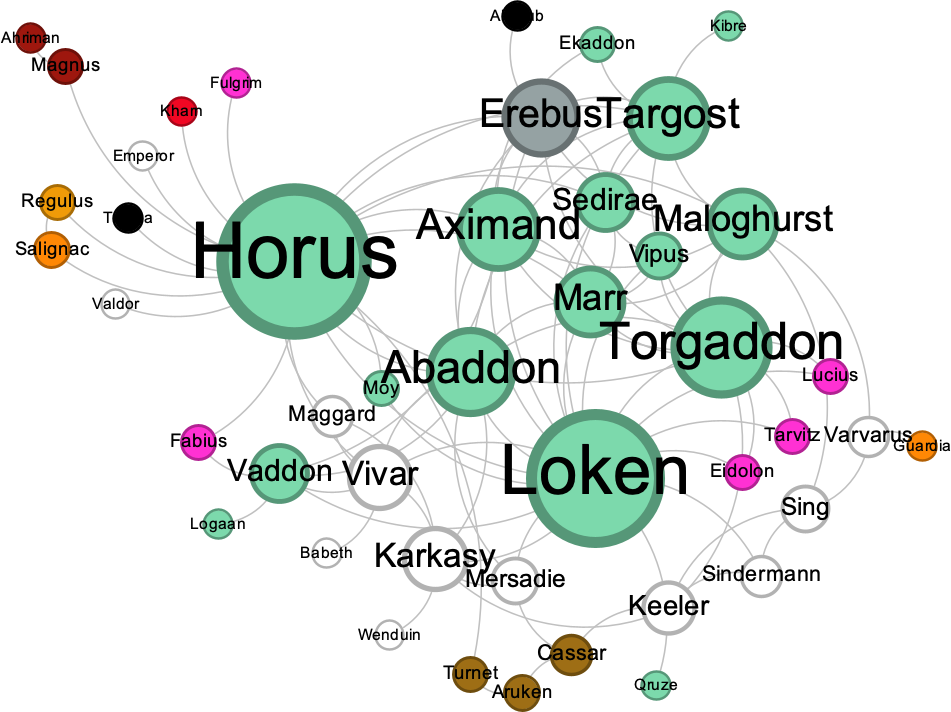
That I think is why there’s value to a Warhammer-specific conference, as part of a broader notion of scholarship around science fiction and fantasy. It is ultimately a shared universe, and an extensive one, with certain familiar tropes, themes and ideas. While I often reference Martha Wells’ Murderbot series in my life, I cannot, generally, rely on an entire conference audience to simply understand that the way I can bank on a Warhammer-specific audience understanding why Rogal Dorn and Sigismund appearing in a book together and not talking to each other is extremely in character.
Take-aways and the Future
So, is there a purpose to all this, and does the notion of Warhammer scholarship have a future? The feeling at the end of the conference was certainly “Yes” – there was a lot of eagerness to continue discussions after we all got on planes to go home, and excitement about the idea that there might be a “next year”. And personally, I’d like to think there’s room for Warhammer-related scholarship, both from the self-interested perspective of wanting to do more Warhammer-related scholarship, but also because I think the idea of asking questions about a setting and a game that’s enjoyed around the world is worth the occasional academic perspective. I’ve never liked the idea that there are somethings that are “worthy” of consideration and some things that are beneath it. Will it change the world? No. But maybe it helps a student who might not otherwise be engaged see something of their interests in academia. Or maybe it helps push back a little bit on the growing tendency to push academic pursuits into corners where there are Metric-driven Deliverables™.
But does this conference really have legs?
Maybe, and maybe not. The fact of the matter is being a conference organizer is a hard, and often somewhat thankless task, and “Preeminent Warhammer Scholar” is very unlikely to be the lynchpin behind anyone getting tenure. It’s entirely possible that simple attrition, shifting priorities, and the demands of academic careers mean this conference won’t appear in future years.
But I’d like it to.
Have any questions or feedback? Drop us a note in the comments below or email us at contact@goonhammer.com. Want articles like this linked in your inbox every Monday morning? Sign up for our newsletter. And don’t forget that you can support us on Patreon for backer rewards like early video content, Administratum access, an ad-free experience on our website and more.
